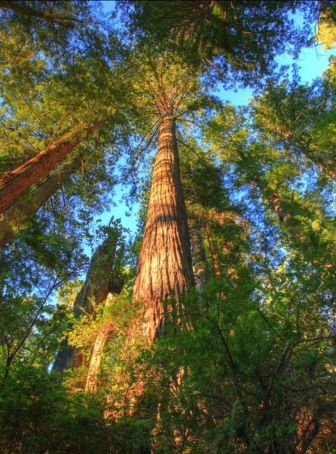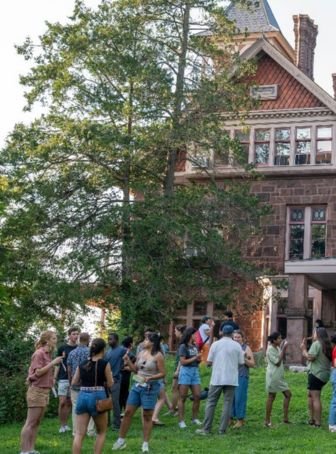
By Sara Santiago ’19 MF, Forest Fellow & Rosa Goldman ’19 MF, Forest Fellow
Over a year ago, the School formally changed its name to the Yale School of the Environment and re-established The Forest School as “a School within a School.” We have experienced remarkable momentum and some growing pains over the past year as we continue to work in pursuit of our goals – connecting people, forests, and forestry for a sustainable future. We also have taken this period as an opportunity to re-imagine our vision and mission, with the input of alumni, students, faculty, and staff.
While the School structure and name is new, a vision and mission for Yale Forestry certainly is not. As a program, Yale Forestry’s vision, mission, and strategic goals were last documented in 1994 in “Redefining Forestry at Yale” by John Gordon, Pinchot Professor, and Jane Coppock, Special Assistant to the Dean. Meetings with faculty, master’s students, and doctoral students contributed to a report outlining a vision for an ideal forestry program and the steps to get there. The three main goals of this report were: 1) to attract and educate leaders, 2) to focus on the science-policy interface of forests, and 3) to use the forest as a teaching concept throughout the broader School.
These goals are not entirely passe. Then and now, Yale Forestry brings together experts to determine how to manage forests, for what and for whom, and over a global scope, just as the 1994 report aspired. Yale Forestry sees itself as a central hub, cultivating leaders and building connections in the forest sector. So, we asked, what parts do we keep from our prior vision, what needs to be refined in this historical moment, and where do we direct our energy, scholarship, and pursuits?
To determine these answers, we created a small working group, including post-graduate Forest Fellows Rosa Goldman ’19 MF and Sara Santiago ’19 MF, The Forest School’s Executive Director Gary Dunning, and its Senior Associate Dean Mark Ashton. As a group, we devised a process to receive valuable input from the very community that makes up The Forest School – faculty, staff, alumni, and current students.
Over the past year, we worked closely with the Poorvu Center for Teaching and Learning at Yale University to develop survey, interview, and focus group questions for current students, alums, faculty, and staff. We wanted feedback from each of these groups about the varied experiences they have had at The Forest School, the benefits and shortcomings of attending and/or working at The Forest School, and the needs of forests and people now and into the future – all of which would inform our vision and mission.
We are proud to say we surveyed and interviewed nearly 300 alums spanning the globe, and representing a wide range of graduation decades, interest areas, expertise, and personal and professional backgrounds. Of the current student body, 35 master’s and doctoral students completed our student survey. Concurrently, the Poorvu Center conducted focus groups of and surveyed 35 staff members. Dean Ashton surveyed and interviewed around 16 faculty members. All faculty, staff, alumni, and students – whether they hold forestry degrees, are forest-focused in their work, and/or are enthusiastic about The Forest School – provided invaluable feedback to shape our future.
From this data, which we organized and coded based on qualitative research methods, we found key themes and calls to action that are now captured in our vision and mission below. Core attributes of the School remain important to the community: centering applied forest ecology, partaking in place-based experiential learning, serving as a hub for people, organizations, and research related to forests, and making the connection between people and forests. We are also called to deepen our commitments and focus to diversity, equity, and justice, elevate the social sciences, remain connected with the practice of forestry, and to develop solutions to major issues facing people and forests now and in the future.
With such a longstanding, unique culture and identity as Yale Forestry – not only as a global hub for people and forests, but an institution of scholarship and community – we are proud to share our collective vision for the future:
Vision:
We seek to lead in advancing science and educating professionals to develop collaborative research, policy, and practice that address vital and compelling issues facing forests and people globally. We strive to do so justly and equitably, elevating a diversity of voices, and in respectful relationships with the land and one another.
Mission:
Rooted in place-based experiential learning and rigorous research, The Forest School within the Yale School of the Environment educates scientists and practitioners to apply forest ecology and social dynamics in their work around the globe. We are a hub for connecting forests and people across disciplines; cultivating collaborations, initiatives, and research that underscore the importance of forests within the broader environmental field. As a school community, we train leaders in the field to be systems thinkers with dynamic and adaptive expertise, developing sustainable solutions for the critical challenges of our time.
Tagline:
Connecting people, forests, and forestry for a sustainable future.
In the coming months, we will be using this same community feedback to inform the creation of The Forest School’s strategic plan, which will guide our work and goals for the next 3-5 years. We deeply appreciate all faculty, staff, alumni, and students who provided thoughtful feedback – a true demonstration of the strength and connectedness of our community. We are also grateful to the Poorvu Center, methods training from faculty, and the Yale School of the Environment’s Offices of the Dean, Communications, and Alumni Services and Development.







